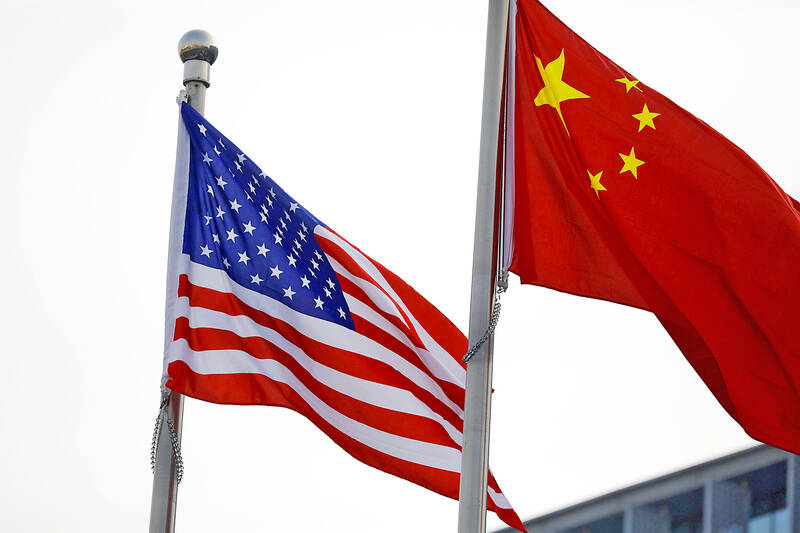The US’ latest National Defense Strategy (NDS) could have far-reaching implications for cross-strait relations and Taiwan’s arms procurements from Washington, Taiwan People’s Party (TPP) Legislator Chang Chi-kai (張?楷) said on Sunday.
Chang’s remarks follow a report published on Friday by Politico that said the Pentagon’s new draft strategy would place greater emphasis on defending the US homeland and western hemisphere, rather than prioritizing threats from China and Russia.
Such a reorientation could have consequences for Taiwan’s security planning and its long-term defense interests, Chang said.

Photo: Reuters
“This represents a major change for cross-strait relations,” he said. “We must carefully consider whether our cooperation with the US, including arms purchases, will be significantly affected.”
Taiwan must continue to strengthen its defense capabilities and ensure it possesses a credible deterrence, while pursuing dialogue and peace across the Taiwan Strait to avoid conflict, he added.
The strategy shift is a departure from US President Donald Trump’s first term, when his administration in the 2018 NDS emphasized deterring Chinese aggression and countering its military rise.
One person who attended a briefing on the draft submitted last week to US Secretary of Defense Pete Hegseth described it as a major reversal that could prompt allies in Europe and Asia to question Washington’s long-term commitments, Politico reported.
The NDS is the Pentagon’s highest-level strategic guidance document, typically issued at the start of each new administration.
While Hegseth could alter the draft, recent developments in the US suggest a more inward-focused posture, Politico reported, citing the White House’s deployment of US National Guard troops to Los Angeles and Washington, and the Pentagon dispatching ships and aircraft to the Caribbean for counternarcotics missions, while authorizing the use of lethal force against noncombatants.
US Undersecretary of Defense for Policy Elbridge Colby, who played a central role in drafting the 2018 NDS, is leading the strategy shift, it said.
Although regarded as a “China hawk,” Colby has also long advocated a more isolationist US foreign policy, aligning with US Vice President J.D. Vance’s call to reduce the US’ overseas commitments, it said.
Colby’s team is also preparing two related reports, expected to be released next month: a global posture review, which would outline US troop deployments worldwide, and a theater air and missile defense review, which would evaluate allied air defense systems and recommend deployment sites, the newspaper said.
Sources told Politico that the three documents emphasize the same theme: urging US allies to assume greater responsibility for their own security, while the US concentrates on defending its own territory and immediate regional interests.

A small number of Taiwanese this year lost their citizenship rights after traveling in China and obtaining a one-time Chinese passport to cross the border into Russia, a source said today. The people signed up through Chinese travel agencies for tours of neighboring Russia with companies claiming they could obtain Russian visas and fast-track border clearance, the source said on condition of anonymity. The travelers were actually issued one-time-use Chinese passports, they said. Taiwanese are prohibited from holding a Chinese passport or household registration. If found to have a Chinese ID, they may lose their resident status under Article 9-1

Taiwanese were praised for their composure after a video filmed by Taiwanese tourists capturing the moment a magnitude 7.5 earthquake struck Japan’s Aomori Prefecture went viral on social media. The video shows a hotel room shaking violently amid Monday’s quake, with objects falling to the ground. Two Taiwanese began filming with their mobile phones, while two others held the sides of a TV to prevent it from falling. When the shaking stopped, the pair calmly took down the TV and laid it flat on a tatami mat, the video shows. The video also captured the group talking about the safety of their companions bathing

A classified Pentagon-produced, multiyear assessment — the Overmatch brief — highlighted unreported Chinese capabilities to destroy US military assets and identified US supply chain choke points, painting a disturbing picture of waning US military might, a New York Times editorial published on Monday said. US Secretary of Defense Pete Hegseth’s comments in November last year that “we lose every time” in Pentagon-conducted war games pitting the US against China further highlighted the uncertainty about the US’ capability to intervene in the event of a Chinese invasion of Taiwan. “It shows the Pentagon’s overreliance on expensive, vulnerable weapons as adversaries field cheap, technologically

Starting on Jan. 1, YouBike riders must have insurance to use the service, and a six-month trial of NT$5 coupons under certain conditions would be implemented to balance bike shortages, a joint statement from transportation departments across Taipei, New Taipei City and Taoyuan announced yesterday. The rental bike system operator said that coupons would be offered to riders to rent bikes from full stations, for riders who take out an electric-assisted bike from a full station, and for riders who return a bike to an empty station. All riders with YouBike accounts are automatically eligible for the program, and each membership account